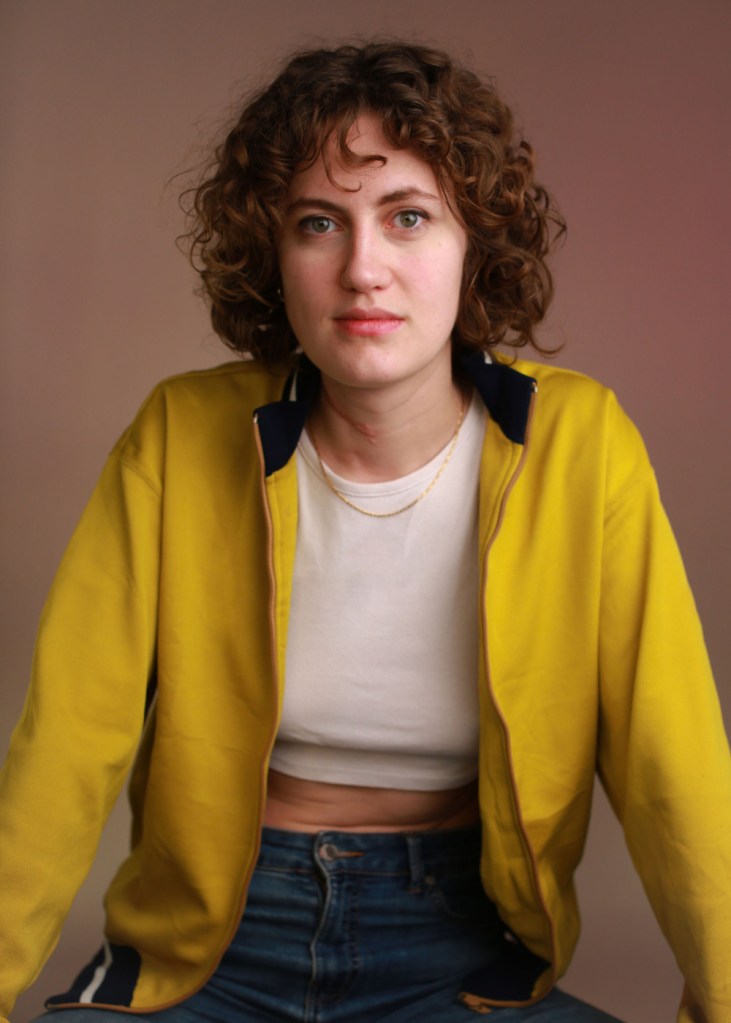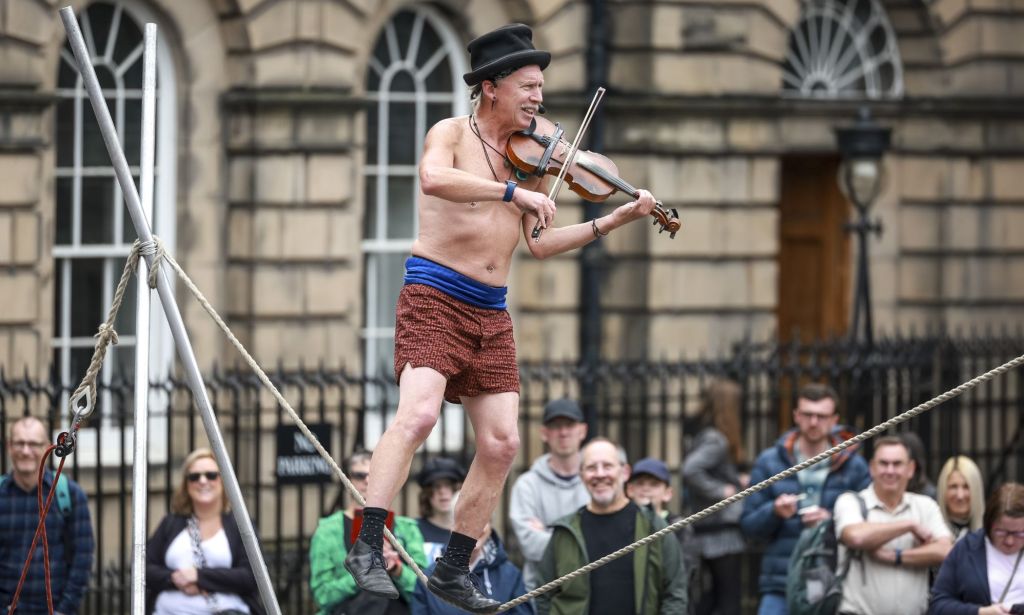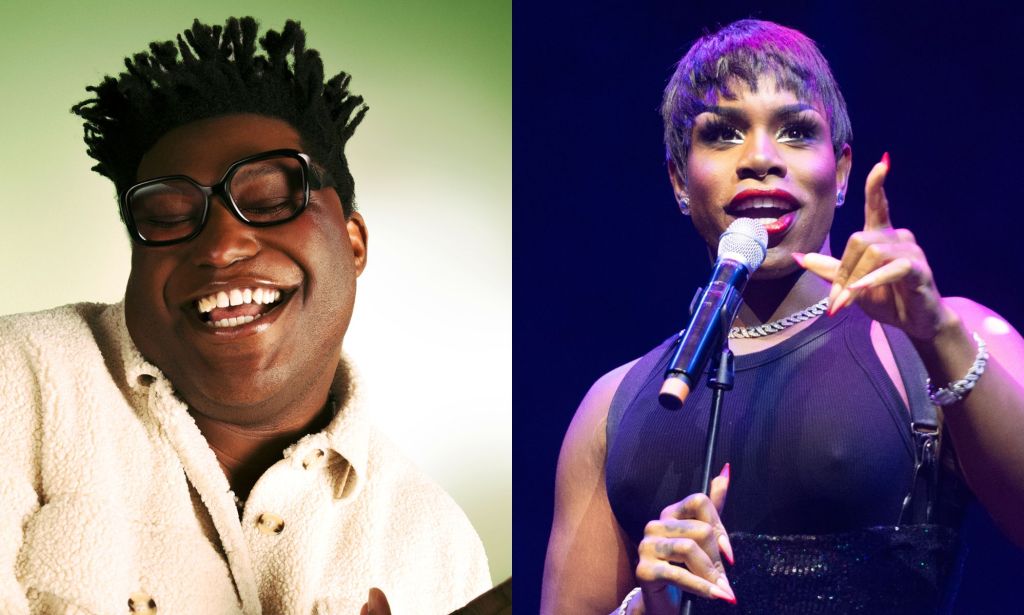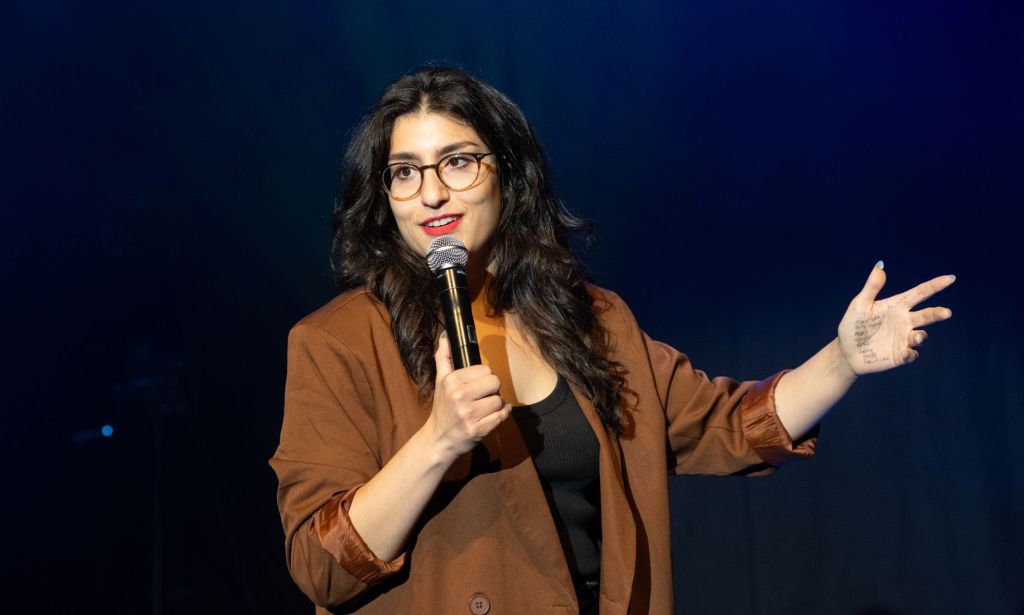How the Edinburgh Fringe became a home for queer performers: ‘It helps me not feel like a freak’

LGBTQ+ Edinburgh Fringe performers Kathy Maniura, Larry Owens, Celya AB and Dan Tiernan. (Supplied)
LGBTQ+ performers have spoken to PinkNews about how the Edinburgh Festival Fringe has become a magnet for queer talent to grow and find a community.
Comedian Kathy Maniura is spending the next few weeks living with two Norwegian clowns and pretending to be a paper straw.
She is, of course, at the Edinburgh Festival Fringe, where she is showcasing her character comedy show Objectified until the end of August. When she’s done for the day, she’s holed up with other queer performers until the next show rolls around.
“There are a lot of queer clowns knocking about here, which is amazing,” she laughs.
Over the course of its 76-year history, Scotland’s Edinburgh Fringe has become renowned as a space where LGBTQ+ artists can thrive. Some of the UK’s biggest queer stars, including Suzy Eddie Izzard, Stephen Fry and Sue Perkins, trace their humble comedic origins back to the festival.

This year is no different. There are dozens of shows by LGBTQ+ performers, from a puppet and drag show about Princess Diana, to a musical biography of Alan Turing and a play about the history of trans men.
There are comedians and clowns, yes, but the Fringe is open to all sorts. During one of her first appearances in Edinburgh, Maniura watched on as queer performer Lucy McCormick, dressed as Jesus for her play Triple Threat, told a disbelieving disciple to finger her.
“There’s stuff you’ll see here that it would be hard to imagine seeing anywhere else,” Maniura points out. “It is the most exciting thing, just going into a room and being like: ‘I have absolutely no idea what’s going to happen in the next hour’.”

She thinks that’s exactly why the Fringe has become a fertile ground for queer performers: each is given a one-hour slot, and they can do whatever they want with it – be that ventriloquism or playing the violin while walking on a tightrope.
“Those forms of self-expression often attract queer people,” Maniura says. The queer community are more likely to be thriving in art forms that are “outside the traditional confines”, she thinks, and the Fringe is the world’s biggest stage for them.
American performer Larry Owens, best known for starring in the original staging of Broadway phenomenon A Strange Loop, agrees. He’s in Edinburgh for the first time this year, with his stand-up show that’s delivered through music, centred on pop culture and identity.
“I don’t think there’s a bigger offering of shows available anywhere else [that are] not contained by genre,” he says of why queer artists gravitate towards the festival. When he arrived, he was greeted by RuPaul’s Drag Race champ and fellow Fringe star Monet X Change, while the festival’s welcome party was crammed full of drag performers. “It’s really refreshing and it helps me to not feel like a freak.”

It helps that the Fringe audience are, on the whole, open and ready for anything. While there’s a burgeoning market for queer and alternative performance in the UK – the UK’s first Queer Comedy Festival had its debut run in June, while the first permanent queer comedy club opened in May – non-queer audiences might still have some trepidation about watching LGBTQ+ artists.
Audiences elsewhere in the UK, for example, might wince at Maniura impersonating an electric scooter, as she does during her show. At the Fringe, they’re up for it.
“They’re a comedy-literate audience who’ve seen loads of weird stuff and are just game,” she says. “That’s the vibe. There’s a sense that people do take a punt here more than in other places.”
The rising hostility towards the LGBTQ+ community has, this year, made its way to the Fringe, however. British drag performer Aida H Dee, who is hosting a Drag Queen Story Hour for children, has seen her posters targeted with anti-LGBTQ+ stickers, while anti-drag bigots claimed they would protest against the opening event in their hundreds – eight people showed up.
On the whole, the Fringe is a “left-leaning, accepting” place, says bisexual stand-up comic and BBC best new comedy award-winner Celya AB. She’s back at the festival for the second successive year, after selling out her show in 2022.
As a “femme” presenting woman who is currently single, she’s never experienced any anti-LGBTQ+ backlash at the festival, although she knows of performers who have.

“There [are] going to be bad people everywhere, unfortunately,” she says. But what makes the Fringe stand apart from other festivals is how it responds to any such incident. The Fringe genuinely does come together and backs up queer people if and when those sort of things happen. Generally, the people at the Fringe have a good heart.”
A lot of those Fringe-goers are queer themselves. AB has been approached after her show by queer comics looking to get into the business. “I just tell them that the industry is full and to not give it a go, and to stop asking for advice,” she jokes. “But do keep buying tickets!”
However, she hardly thinks about the Fringe as a queer space.
“It’s just so part of the Fringe,” she says, adding that queerness is “not even something that defines the performer any more”.
It’s true: gone are the days when LGBTQ+ artists are expected to make light of their identity for laughs. Gay comedian Dan Tiernan is bringing his debut show, Going Under, to Edinburgh this year, and, while he does touch on his sexuality, it’s a whole lot more than that. He discusses his dyspraxia, his previous job as a dinner lady and leaving home for the first time.
“A lot of queer performers [are] super bold and a bit outrageous… and there will be an audience somewhere [at] the Fringe out there just willing to get on board,” he says. But being rambunctiously, overtly queer isn’t essential for LGBTQ+ people to succeed at the festival.
“I’ve always wanted to not have a queer angle, and not to have a straight angle or not to have any angle, but try to be me, just how I am,” Tiernan says.
Regardless of whether an artist injects their identity into their performance or not, it’s still affirming being around people who understand your life experience.
“It’s queer joy,” Maniura says simply. “You just want to share it, especially when you’re in spaces that feel safe, and you’re around like-minded people. That can feel fundamental.”
The line-up of LGBTQ+ performers she’s got on her watch-list this year is extensive. There’s Simon David’s one-man Dead Dad Show and fellow character comedian Lorna Rose Treen’s Skin Pigeon.
Meanwhile, Celya AB is looking forward to seeing trans comedian Jen Ives, and for Larry Owens, it’s Ruby McCollister’s cabaret Tragedy.
At a time where queer people are being attacked by bigots and politicians from across the political spectrum, the Edinburgh Festival Fringe is a queer haven.
“It feels like our rights are under threat,” Maniura says. “It feels very important that queer people are able to be completely themselves and express themselves, and to have safe spaces to do that.”
The Edinburgh Fringe Festival takes place until 28 August.
Tickets are available now for the Edinburgh Fringe shows from Celya AB, Kathy Maniura, Larry Owens and Dan Tiernan.

